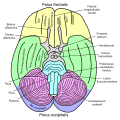Middle cerebellar peduncle
| Middle cerebellar peduncle | |
|---|---|
 Dissection showing the projection fibers of the cerebellum. (Middle peduncle labeled at upper right.) | |
| Details | |
| Identifiers | |
| Latin | pedunculus cerebellaris medius |
| MeSH | D065837 |
| NeuroNames | 620 |
| NeuroLex ID | birnlex_1529 |
| TA98 | A14.1.05.003 A14.1.07.416 |
| TA2 | 5848 |
| FMA | 72515 |
| Anatomical terms of neuroanatomy [edit on Wikidata] | |
The middle cerebellar peduncle (or brachium pontis[1]) is a paired structure of the brain. It connects the pons to the cerebellum, with fibres originating from the pontine nucleus and travelling to the opposite hemisphere of the cerebellar cortex. It is supplied by the anterior inferior cerebellar artery (AICA) and branches from the basilar artery. It conveys information from the cerebrum and the pons to the cerebellum.
Structure
The middle cerebellar peduncle is the largest of the three cerebellar peduncles. It connects the pons and cerebellum. It consists almost entirely of fibers passing from the pons to the cerebellum (fibrocerebellar fibers); the fibers arise from the pontine nuclei and decussate within the pons before entering the peduncle[1] to end in the contralateral hemisphere of the cerebellar cortex.[2]
The trigeminal nerve (CN V) arises from the lateral pons very close to the middle cerebellar peduncle.[3]
Blood supply
The middle cerebellar peduncle is supplied by the anterior inferior cerebellar artery (AICA), as well as smaller branches from the basilar artery.[4]
Clinical significance
Infarction of the anterior inferior cerebellar artery (AICA) can damage the middle cerebellar peduncle.[4] Diffuse intrinsic pontine glioma may spread from the pons into the middle cerebellar peduncle.[5]
Additional images
-
 Scheme showing the connections of the several parts of the brain.
Scheme showing the connections of the several parts of the brain. -
 Superficial dissection of brain-stem. Lateral view.
Superficial dissection of brain-stem. Lateral view. -
 Hind- and mid-brains; postero-lateral view.
Hind- and mid-brains; postero-lateral view. -
 Upper part of medulla spinalis and hind- and mid-brains; posterior aspect, exposed in situ.
Upper part of medulla spinalis and hind- and mid-brains; posterior aspect, exposed in situ. -
 Basal view of a human brain
Basal view of a human brain - Dissection of human midbrain with middle cerebellar peduncle labeled.
-
 Cross section through lower pons showing part of the middle cerebellar peduncle (#19) forming from the convergence of pontocerebellar fibers.
Cross section through lower pons showing part of the middle cerebellar peduncle (#19) forming from the convergence of pontocerebellar fibers. - Middle cerebellar peduncle
- Cerebrum. Deep dissection. Inferior dissection.
- Fourth ventricle. Posterior view.Deep dissection.
- Cerebrum.Inferior view.Deep dissection.
- Cerebrum.Inferior view.Deep dissection.
- Cerebrum.Inferior view.Deep dissection.
- Cerebellum. Inferior surface.
- Cerebellum. Inferior surface.
- Cerebellum. Inferior surface.
See also
References
![]() This article incorporates text in the public domain from the 20th edition of Gray's Anatomy (1918)
This article incorporates text in the public domain from the 20th edition of Gray's Anatomy (1918)
- ^ a b Patestas, Maria A.; Gartner, Leslie P. (2016). A Textbook of Neuroanatomy (2nd ed.). Hoboken, New Jersey: Wiley-Blackwell. p. 290. ISBN 978-1-118-67746-9.
- ^ Voogd, Jan; Ruigrok, Tom J. H. (2012). "15 - Cerebellum and Precerebellar Nuclei". The Human Nervous System (3rd ed.). Academic Press. pp. 471–545. doi:10.1016/B978-0-12-374236-0.10015-X. ISBN 978-0-12-374236-0.
- ^ Franklin, S. (2017). "5 - The Peripheral and Central Nervous System". Conn's Translational Neuroscience. Academic Press. pp. 113–129. doi:10.1016/B978-0-12-802381-5.00007-5. ISBN 978-0-12-802381-5.
- ^ a b DeMyer, William (2009). Stroke in Children and Young Adults (2nd ed.). Saunders. pp. 15–68. doi:10.1016/B978-0-7506-7418-8.00002-1. ISBN 978-0-7506-7418-8.
- ^ Vitanza, Nicholas A.; Fisher, Paul G.; Deisseroth, Michelle Monje (2017). "128 - Diffuse Intrinsic Pontine Glioma". Swaiman's Pediatric Neurology (6th ed.). Elsevier. pp. 991–994. doi:10.1016/B978-0-323-37101-8.00128-4. ISBN 978-0-323-37101-8.
External links
- Atlas image: n2a7p4 at the University of Michigan Health System



























